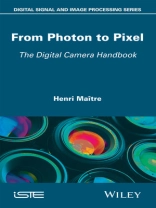The digital camera conceals remarkable technological innovations that affect the formation of the image, the color representation or automated measurements and settings.
** From photon to pixel photon ** describes the device both from the point of view of the physics of the phenomena involved, as technical components and software it uses. Based on the perceptual properties of the visual system as well as on standard transmission and representation, analyzes the solutions to meet the demands of the photographer on the development, contrast, white balance or stabilization of image.
The advanced architectures adopted in mobile phones and developments of computational photography are also presented, foreshadowing the features of the future device.
Mục lục
Acknowledgments xiii
Chapter 1. First Contact 1
1.1. Toward a society of the image 1
1.2. The reason for this book 10
1.3. Physical principle of image formation 11
1.4. Camera block diagram 21
Chapter 2. The Photographic Objective Lens 25
2.1. Focusing 26
2.2. Depth of field 34
2.3. Angle of view 38
2.4. Centered systems 41
2.5. Fisheye systems 56
2.6. Incoherent diffraction 62
2.7. Camera calibration 73
2.8. Aberrations 78
Chapter 3. The Digital Sensor 87
3.1. Sensor size 88
3.2. The photodetector 91
3.3. Integrated filters in the sensor 102
Chapter 4. Radiometry and Photometry 109
4.1. Radiometry: physical parameters 110
4.2. Subjective aspects: photometry 124
4.3. Real systems 127
4.4. Radiometry and photometry in practice 132
4.5. From the watt to the ISO 136
Chapter 5. Color 145
5.1. From electromagnetic radiation to perception 147
5.2. Color spaces 152
5.3. The white balance 170
5.4. Acquiring color 178
5.5. Reconstructing color: demosaicing 195
Chapter 6. Image Quality 205
6.1. Qualitative attributes 206
6.2. Global image quality assessment 226
6.3. Information capacity 237
Chapter 7. Noise in Digital Photography 253
7.1. Photon noise 254
7.2. Electronic noise 261
7.3. Non-uniform noise 264
7.4. Noise models for image acquisition 265
Chapter 8. Image Representation: Coding and Formats 269
8.1. ‘Native’ format and metadata 270
8.2. RAW (native) format 271
8.3. Metadata 279
8.4. Lossless compression formats 282
8.5. Image formats for graphic design 286
8.6. Lossy compression formats 289
8.7. Tiled formats 299
8.8. Video coding 302
8.9. Compressed sensing 306
Chapter 9. Elements of Camera Hardware 309
9.1. Image processors 309
9.2. Memory 317
9.3. Screens 323
9.4. The shutter 329
9.5. Measuring focus 331
9.6. Stabilization 342
9.7. Additions to the lens assembly: supplementary lenses and filters 349
9.8. Power cells 364
Chapter 10. Photographic Software 369
10.1. Integrated software 370
10.2. Imported software 390
10.3. External software 393
Bibliography 413
Index 435
Giới thiệu về tác giả
Henri Matre, Emeritus Professor at Télécom Paris Tech, France.












